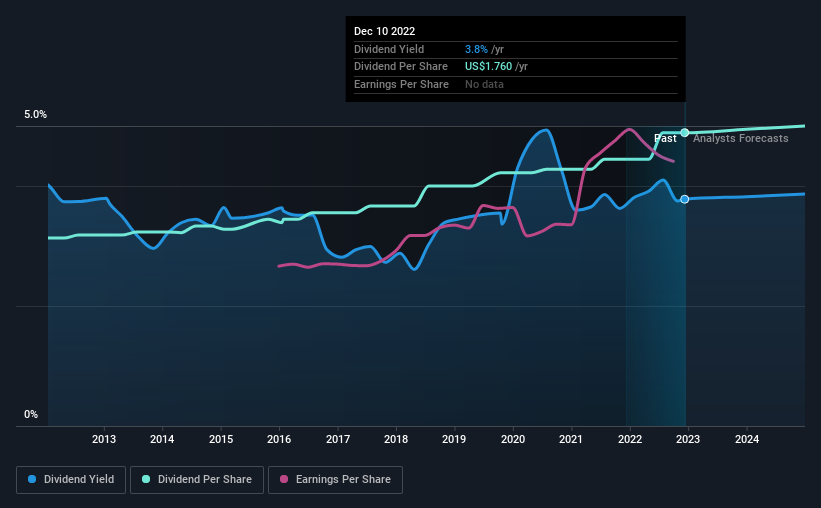Community Trust Bancorp, Inc. (NASDAQ:CTBI) Passed Our Checks, And It's About To Pay A US$0.44 Dividend
Community Trust Bancorp, Inc. (NASDAQ:CTBI) is about to trade ex-dividend in the next two days. The ex-dividend date is usually set to be one business day before the record date which is the cut-off date on which you must be present on the company's books as a shareholder in order to receive the dividend. The ex-dividend date is of consequence because whenever a stock is bought or sold, the trade takes at least two business day to settle. In other words, investors can purchase Community Trust Bancorp's shares before the 14th of December in order to be eligible for the dividend, which will be paid on the 3rd of January.
The company's next dividend payment will be US$0.44 per share. Last year, in total, the company distributed US$1.76 to shareholders. Last year's total dividend payments show that Community Trust Bancorp has a trailing yield of 3.8% on the current share price of $46.57. If you buy this business for its dividend, you should have an idea of whether Community Trust Bancorp's dividend is reliable and sustainable. So we need to check whether the dividend payments are covered, and if earnings are growing.
View our latest analysis for Community Trust Bancorp
If a company pays out more in dividends than it earned, then the dividend might become unsustainable - hardly an ideal situation. Fortunately Community Trust Bancorp's payout ratio is modest, at just 37% of profit.
Companies that pay out less in dividends than they earn in profits generally have more sustainable dividends. The lower the payout ratio, the more wiggle room the business has before it could be forced to cut the dividend.
Click here to see the company's payout ratio, plus analyst estimates of its future dividends.
Have Earnings And Dividends Been Growing?
Companies with consistently growing earnings per share generally make the best dividend stocks, as they usually find it easier to grow dividends per share. If earnings fall far enough, the company could be forced to cut its dividend. Fortunately for readers, Community Trust Bancorp's earnings per share have been growing at 10% a year for the past five years.
The main way most investors will assess a company's dividend prospects is by checking the historical rate of dividend growth. Since the start of our data, 10 years ago, Community Trust Bancorp has lifted its dividend by approximately 4.6% a year on average. It's good to see both earnings and the dividend have improved - although the former has been rising much quicker than the latter, possibly due to the company reinvesting more of its profits in growth.
To Sum It Up
From a dividend perspective, should investors buy or avoid Community Trust Bancorp? When companies are growing rapidly and retaining a majority of the profits within the business, it's usually a sign that reinvesting earnings creates more value than paying dividends to shareholders. This strategy can add significant value to shareholders over the long term - as long as it's done without issuing too many new shares. Overall, Community Trust Bancorp looks like a promising dividend stock in this analysis, and we think it would be worth investigating further.
So while Community Trust Bancorp looks good from a dividend perspective, it's always worthwhile being up to date with the risks involved in this stock. Be aware that Community Trust Bancorp is showing 2 warning signs in our investment analysis, and 1 of those is a bit unpleasant...
A common investing mistake is buying the first interesting stock you see. Here you can find a full list of high-yield dividend stocks.
Have feedback on this article? Concerned about the content? Get in touch with us directly. Alternatively, email editorial-team (at) simplywallst.com.
This article by Simply Wall St is general in nature. We provide commentary based on historical data and analyst forecasts only using an unbiased methodology and our articles are not intended to be financial advice. It does not constitute a recommendation to buy or sell any stock, and does not take account of your objectives, or your financial situation. We aim to bring you long-term focused analysis driven by fundamental data. Note that our analysis may not factor in the latest price-sensitive company announcements or qualitative material. Simply Wall St has no position in any stocks mentioned.
Join A Paid User Research Session
You’ll receive a US$30 Amazon Gift card for 1 hour of your time while helping us build better investing tools for the individual investors like yourself. Sign up here

